Movie Review
 |
 |
 |
 |
 |
 |
 |
Dazzling & Sumptuous Revolutionary Ideas
Louise G. Fisher
Crazy Rich Asians is a movie that was released in the summer of 2018 that is significant due to its majority Asian heritage cast. Critics breathlessly praise it as “a dazzling, sumptuous success” that is a “spectacular, heartwarming, instant classic.” (1)
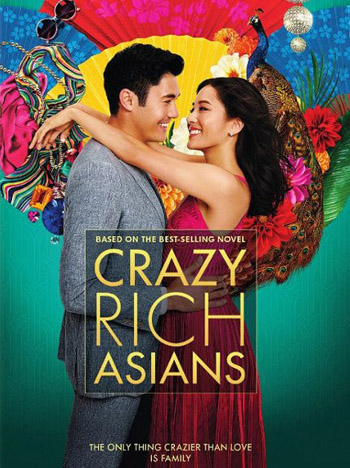 The movie’s poster is colorful, but it already hints at the sensuality and extravagance present in the movie.
The movie’s poster is colorful, but it already hints at the sensuality and extravagance present in the movie.
The premise of the movie is that Singapore’s very wealthy and eligible bachelor, Nick Young, has been living in New York City with his Chinese-American girlfriend, Rachel Chu. She is an economics professor at NYU specializing in game theory.
Nick only tells Rachel about his family's wealth and prominence in society during their plane ride to Singapore for his friend’s wedding. Rachel then overcomes multiple hurdles, especially Nick’s protective mother Eleanor, in order to be with him. Despite the differences between their families in culture and values, the couple ends up together because “love conquers all.” (2)
The film is a colorful and opulent feast that delights one’s eyes and imagination. For example, the sumptuously decorated homes of Nick’s family are refined. Unfortunately, it is through this elegant framing that the viewer is invited to follow the bad customs. This movie glosses over immoral behaviors with beautiful settings.
 Sensuality & decadence
Sensuality & decadence
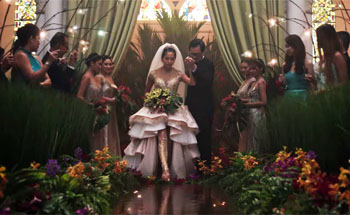 Hollywood’s customary offenses against modesty are present in the film, framed by a capitalist extravagance, which is present in the wedding scene. The chapel is flooded with water and decorated like a jungle. The bride Araminta Lee wears crystal leggings and no shoes to walk down the aisle in order to appear to walk on water. Is that a parody of Our Lord’s walking on the stormy sea?
Hollywood’s customary offenses against modesty are present in the film, framed by a capitalist extravagance, which is present in the wedding scene. The chapel is flooded with water and decorated like a jungle. The bride Araminta Lee wears crystal leggings and no shoes to walk down the aisle in order to appear to walk on water. Is that a parody of Our Lord’s walking on the stormy sea?
Characters throughout the movie wear immodest attire that borders on nudity. Plunging necklines and short, tight clothes reveal every inch of a woman’s form; men wear shirts that are completely unbuttoned. Absurd or vulgar outfits are presented alongside modest and exquisite dresses and suits. The film’s message is that one can dress however he likes, depending only on his personal opinion, with no regard for modesty.
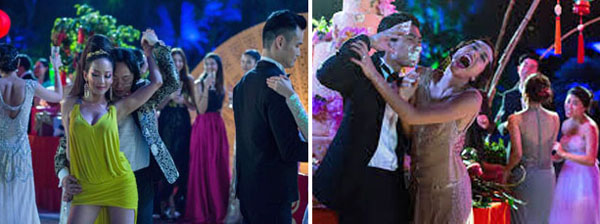
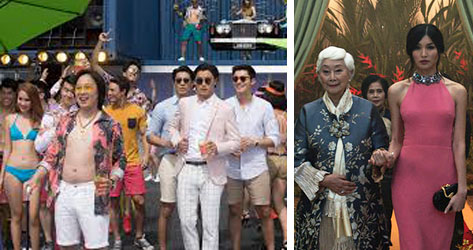 Offending purity
Offending purity
With regards to homosexuality, Singapore is relatively conservative. Its Penal Code still criminalizes sodomy. (3) Using emotions, this movie attempts to change that good position.
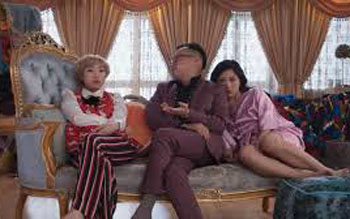 The “gay best friend trope” is in full force in the character Oliver Tsien, the “rainbow sheep” of the family. He is portrayed as fashionable and likeable. He is one of the few people who provides the heroine support and kindness. This sympathetic portrayal of homosexuality should not surprise us, given that the film’s producer is a lesbian. (4)
The “gay best friend trope” is in full force in the character Oliver Tsien, the “rainbow sheep” of the family. He is portrayed as fashionable and likeable. He is one of the few people who provides the heroine support and kindness. This sympathetic portrayal of homosexuality should not surprise us, given that the film’s producer is a lesbian. (4)
It is also obvious that Rachel and Nick have been cohabitating and engaging in premarital relations. Eleanor, Nick’s mother and the de facto antagonist in the movie, gently suggests to her son that he and Rachel not sleep in the same room. Her son rebels against her and stays at a hotel in protest to her old-fashioned “morals.” At the hotel, Nick and Rachel are shown waking up in bed together, and the camera lingers unnecessarily on Nick’s bare torso.
The Struggle against Tradition & Patriarchy
East Asia, including Singapore, is a traditionally patriarchal society. One would not know this at all from watching this movie, in which there are no good male role models and few fathers in sight.
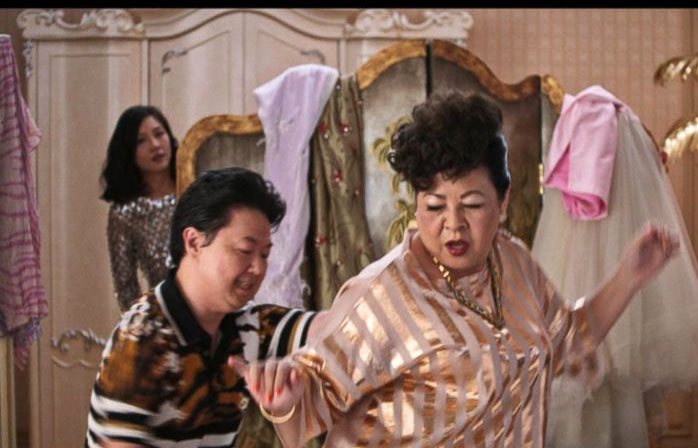 The most prominent father present in the film is a caricature, Wye Mun Goh. He is a nouveau riche man who is corrupted by his wealth. His house is gaudily decorated; his clothes are outlandish; his behavior is buffoonish. However, he is portrayed as a kind and supportive man whose family loves him whilst the audience laughs at him, an extravagant and foolish father and husband.
The most prominent father present in the film is a caricature, Wye Mun Goh. He is a nouveau riche man who is corrupted by his wealth. His house is gaudily decorated; his clothes are outlandish; his behavior is buffoonish. However, he is portrayed as a kind and supportive man whose family loves him whilst the audience laughs at him, an extravagant and foolish father and husband.
This vacuum of masculinity is filled by intrigue and gossip. For example, Nick’s other female friends start rumors that Rachel is a gold digger because her family name is unknown and she was raised by a single mother.
In one scene, Rachel enjoys making dumplings with the Young family. Although this task could easily have been left to the servants, the family members choose to do this themselves to carry on a tradition. Eleanor explains to Rachel that dumpling wrapping is symbolic of her family’s many traditions. The underlying criticism is that Rachel may not maintain family traditions since she lacks them.
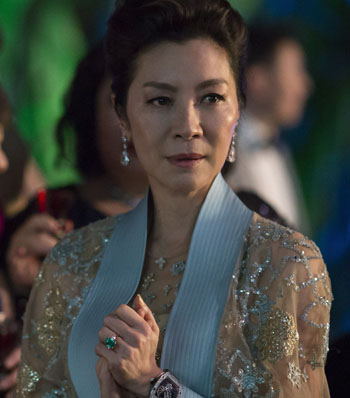 Rachel then admires Eleanor’s beautiful emerald ring. Eleanor tells her how she met her husband, who gave her the ring, and how she decided to abandon her career to help his business and to raise their family. “For me, it was a privilege. But for you, you may think it is old fashioned,” she continues, “but all this doesn’t just happen. It is because we know to put family first, instead of chasing one’s passion.”
Rachel then admires Eleanor’s beautiful emerald ring. Eleanor tells her how she met her husband, who gave her the ring, and how she decided to abandon her career to help his business and to raise their family. “For me, it was a privilege. But for you, you may think it is old fashioned,” she continues, “but all this doesn’t just happen. It is because we know to put family first, instead of chasing one’s passion.”
So, the message is that Eleanor thinks that Rachel has the American mentality of “finding one’s bliss” and lacks family traditions and roots.
If Nick’s father were to play a prominent role in his life, instead of allowing intrigue to fester, Nick and his father would have had a private discussion to resolve the conflict in a day. The absence of his father would explain why Nick is a bad example of a future husband since he lacks a good role model.
He deceives the person he allegedly loves by not telling her who he really is. Marriage unites families. It is not wise to hide one’s background and family, crucial aspects of a person’s personality, from a prospective spouse; yet this is exactly what Nick does.
Moreover, Nick is a weak man. His father constantly being away on business is one of the reasons for his weakness. Again, his father literally makes no appearance in the movie. Nick has been groomed his whole life to take over the vast family business. His family expects that he will continue their legacy and honor, which has lasted for generations.
Instead of manfully accepting the challenge and accepting his role as the future patriarch, he dissolves into sentimental effeminacy. He proposes to Rachel against his family’s wishes and friend’s advice in order to “start a new life together in New York,” and offers to “leave all of this behind.” He is willing to throw away his family heritage. It is yet another display of selfishness, thinking of only his own happiness.
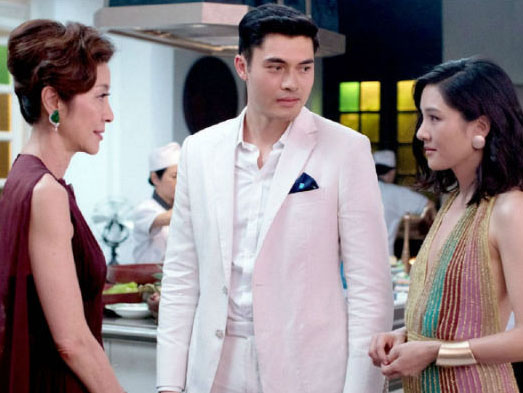 From a Catholic perspective, the truth lies in a balanced position. Filial piety and respect must be observed. However, parents should also be supportive of their children’s vocation, even if it may not be what they had been expecting. This movie misses this distinction because its main conflict is that Nick’s family does not think that Rachel is a good match for him, instead of about whether or not he is fulfilling what God wants him to be.
From a Catholic perspective, the truth lies in a balanced position. Filial piety and respect must be observed. However, parents should also be supportive of their children’s vocation, even if it may not be what they had been expecting. This movie misses this distinction because its main conflict is that Nick’s family does not think that Rachel is a good match for him, instead of about whether or not he is fulfilling what God wants him to be.
In the end, Eleanor surrenders and consents to the marriage. Rachel is still an American “career-woman” who has not shown a willingness to focus on family and to preserve traditions; Nick has still not shown that he is capable of running a business or would be a competent leader of the family. The message is that “love conquers all” is a panacea that supposedly will preserve Nick, Rachel and their families together.
Counter-revolutionary Catholics know better. Preserving relationships are important and sacrifices for the good of one’s family and honor may be needed. However, preserving souls is more important, a consideration not mentioned in the movie, and to achieve this vital goal there must be sacrifices for virtue and God’s greater glory.


The premise of the movie is that Singapore’s very wealthy and eligible bachelor, Nick Young, has been living in New York City with his Chinese-American girlfriend, Rachel Chu. She is an economics professor at NYU specializing in game theory.
Nick only tells Rachel about his family's wealth and prominence in society during their plane ride to Singapore for his friend’s wedding. Rachel then overcomes multiple hurdles, especially Nick’s protective mother Eleanor, in order to be with him. Despite the differences between their families in culture and values, the couple ends up together because “love conquers all.” (2)
The film is a colorful and opulent feast that delights one’s eyes and imagination. For example, the sumptuously decorated homes of Nick’s family are refined. Unfortunately, it is through this elegant framing that the viewer is invited to follow the bad customs. This movie glosses over immoral behaviors with beautiful settings.

Nick’s home reflects the elegant Peranakan style, combining Chinese, English, Malaysian & Victorian influences; the symmetry is very pleasing

Characters throughout the movie wear immodest attire that borders on nudity. Plunging necklines and short, tight clothes reveal every inch of a woman’s form; men wear shirts that are completely unbuttoned. Absurd or vulgar outfits are presented alongside modest and exquisite dresses and suits. The film’s message is that one can dress however he likes, depending only on his personal opinion, with no regard for modesty.

Unbridled sensuality & hysterical celebrations, just like modern Western wedding receptions

The viewer is confused seeing persons wearing immodest clothes next to modest styles
With regards to homosexuality, Singapore is relatively conservative. Its Penal Code still criminalizes sodomy. (3) Using emotions, this movie attempts to change that good position.

Flamboyant Tsien, a sympathetic ally to the heroine
It is also obvious that Rachel and Nick have been cohabitating and engaging in premarital relations. Eleanor, Nick’s mother and the de facto antagonist in the movie, gently suggests to her son that he and Rachel not sleep in the same room. Her son rebels against her and stays at a hotel in protest to her old-fashioned “morals.” At the hotel, Nick and Rachel are shown waking up in bed together, and the camera lingers unnecessarily on Nick’s bare torso.
The Struggle against Tradition & Patriarchy
East Asia, including Singapore, is a traditionally patriarchal society. One would not know this at all from watching this movie, in which there are no good male role models and few fathers in sight.

The buffoon behavior of Mun Goh and his wife
This vacuum of masculinity is filled by intrigue and gossip. For example, Nick’s other female friends start rumors that Rachel is a gold digger because her family name is unknown and she was raised by a single mother.
In one scene, Rachel enjoys making dumplings with the Young family. Although this task could easily have been left to the servants, the family members choose to do this themselves to carry on a tradition. Eleanor explains to Rachel that dumpling wrapping is symbolic of her family’s many traditions. The underlying criticism is that Rachel may not maintain family traditions since she lacks them.

Eleanor's emerald ring symbolizes sacrifice, family duty and honor
So, the message is that Eleanor thinks that Rachel has the American mentality of “finding one’s bliss” and lacks family traditions and roots.
If Nick’s father were to play a prominent role in his life, instead of allowing intrigue to fester, Nick and his father would have had a private discussion to resolve the conflict in a day. The absence of his father would explain why Nick is a bad example of a future husband since he lacks a good role model.
He deceives the person he allegedly loves by not telling her who he really is. Marriage unites families. It is not wise to hide one’s background and family, crucial aspects of a person’s personality, from a prospective spouse; yet this is exactly what Nick does.
Moreover, Nick is a weak man. His father constantly being away on business is one of the reasons for his weakness. Again, his father literally makes no appearance in the movie. Nick has been groomed his whole life to take over the vast family business. His family expects that he will continue their legacy and honor, which has lasted for generations.
Instead of manfully accepting the challenge and accepting his role as the future patriarch, he dissolves into sentimental effeminacy. He proposes to Rachel against his family’s wishes and friend’s advice in order to “start a new life together in New York,” and offers to “leave all of this behind.” He is willing to throw away his family heritage. It is yet another display of selfishness, thinking of only his own happiness.

In the end, reconciliation of the 'traditional' Eleanor and the very modern Rachel
In the end, Eleanor surrenders and consents to the marriage. Rachel is still an American “career-woman” who has not shown a willingness to focus on family and to preserve traditions; Nick has still not shown that he is capable of running a business or would be a competent leader of the family. The message is that “love conquers all” is a panacea that supposedly will preserve Nick, Rachel and their families together.
Counter-revolutionary Catholics know better. Preserving relationships are important and sacrifices for the good of one’s family and honor may be needed. However, preserving souls is more important, a consideration not mentioned in the movie, and to achieve this vital goal there must be sacrifices for virtue and God’s greater glory.

- Alissa Wilkinson - "Crazy Rich Asians Is a Dazzling, Sumptuous Success." Vox. August 25, 2018. Accessed June 28, 2019.
Freeman, Molly. "Crazy Rich Asians Movie Review," ScreenRant, August 15, 2018. Accessed June 28, 2019. - "Henry Golding on Crazy Rich Asians: I'm Proud of Beautiful Asian Film," South China Morning Post. August 16, 2018. Accessed June 28, 2019.
- Chirag Agarwal - "Singapore: Crazy Rich But Still Behind on Gay Rights," The Diplomat. October 25, 2018. Accessed June 28, 2019.
- Vivian Sternwood - "Crazy Rich Asians Producer Nina Jacobson's Drive for Inclusion in Hollywood: A Timeline of Her Successful Career."
The Hollywood Reporter. December 18, 2018. Accessed June 28, 2019.
Posted July 19, 2019
______________________
______________________





